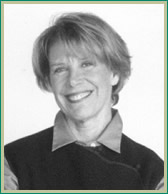
Fast Friends
|
 |
|
Kathleen Alfiero |
Here’s how my friend Maureen described what was happening in her head—all day, every day: A room full of nuns sitting around a conference table talking about the principles of how to be a good girl. There’s a chalkboard behind them, I added, with the sentiment “I am sorry” and the word “shouldn’t” written over and over in white chalk. That’s how we both felt: Many headmasters sorting out in black and white how best to live life.
In our early twenties, Maureen and I realized that we had learned to please others more than ourselves. We even admitted to feeling a sense of pride about that. What a bogus notion! We got excited as we explored a new idea: the possibility that we could change any belief we held that didn’t work for us.
Obviously we grew up Catholic. Confronted by our new questions, amid all the things we had learned about right and wrong—from Church doctrines, from our parents, teachers, and other authority figures—there was only one thing we knew for sure: Neither one of us felt as good as we knew we could.
Maureen and I reviewed the traumas of our childhoods, hoping to discover the origins of these broken records playing in our heads. We knew they deserved our intervention. Both of us were seeing therapists who helped us to stay on the problem-solving, fix-our-defects track. The choice to pick at painful experiences from our past didn’t make us feel good, but we were too young and new to the idea of false assumptions to stop doing it. Each of us made some progress in therapy (everything we do has value, right?), but finally we concluded that by paying attention to the problem, we were essentially keeping our limitations at the forefront of our experiences. And therefore limiting the amount of joy we felt every day.
We came to understand that beliefs are nothing more than thoughts that we have a habit of thinking. The best thing about this revelation is the understanding that accompanies it: Habits can be broken. We don’t have to continue believing things that don’t serve us.
Maureen and I eventually exposed a collective and strongly held belief, one that busied our heads and convinced us to continue digging at our “issues”: If we followed the rules and subscribed to the choice to struggle, we’d have a better shot at the good stuff promised us in the afterlife. The afterlife is a big deal in religious organizations. What became clear to Maureen and me was that focusing on how to be happy when we die didn’t set us up to experience much joy in life.
We came to this Earth for fun, not struggle. We are not defective. We’ll always have negative emotions, thank goodness. I appreciate that they inspire me to know what I want. Even the most seemingly insignificant things that bother me inspire me to become more of who I am. “The improvement I am seeking is…” is a phrase I will eternally live out.
In those early awakening years, Maureen and I knew that our hearts were tugging at our beliefs that were (and still are, as our lives unfold), the foundation of our discomforts. Our hearts were doing their job well, demanding that we focus on what really matters: how we feel.
That’s what the heart does. It speaks to us about joy, love, fun, and appreciation. It teaches us that our emotions matter most. Our heart loves. It insists that the thoughts percolating in our heads are not our enemies but are, when appreciated, vital contributors to our well-being.
A dilemma exists when we ignore our heart’s leadership and allow our head to flounder on alone. Intentionally refocusing any negative thought to even a slightly better-feeling one brings our head closer to our heart. Our heart supports stopping any momentum that is leading us away from feeling passionate and joyful. Once we understand this, we just need to practice paying attention to how we feel.
Practicing intentionally feeling good before our mind has rationalized why we should helps us to release any resistance we have to manifesting our desires. We are forward-moving creatures meant to always want more. Some people think that wanting things gets us into trouble and is too often self-serving, but the opposite is true. Our desires are vital in the process of our becoming more of who we are.
Believing that everything always works out, we are guided to understand that there is another reality where everything we want exists. We can’t see this reality with our eyes, or hear it with our ears, or experience it with our other senses, but it is there. “Take it on faith,” the nuns told us—and that was a good thing.
My mother inspired me to not take life too seriously; Maureen has always been attracted to that quality in me. She and I laugh more than ever now. We know to be lighthearted and chill out. Sometimes Maureen uses her head to support me as I work to remember what I know when I feel “off.” My heart is in it when I remind Maureen that everything is temporary when she has pain in her joints.
I acknowledge and cherish the fact that I’ve created a great life with a loving family and many friends. I have fun times most every day, I laugh a ton, experience satisfaction with my work, and bask in amazing moments of happiness.
Like Maureen and me, my heart and my head are now fast friends. Daily, I am encouraged to appreciate and love who I am.
![]()
Center for Empowered Leadership ®
Email: info@cfel.org
Phone: 1.609.259.7911
